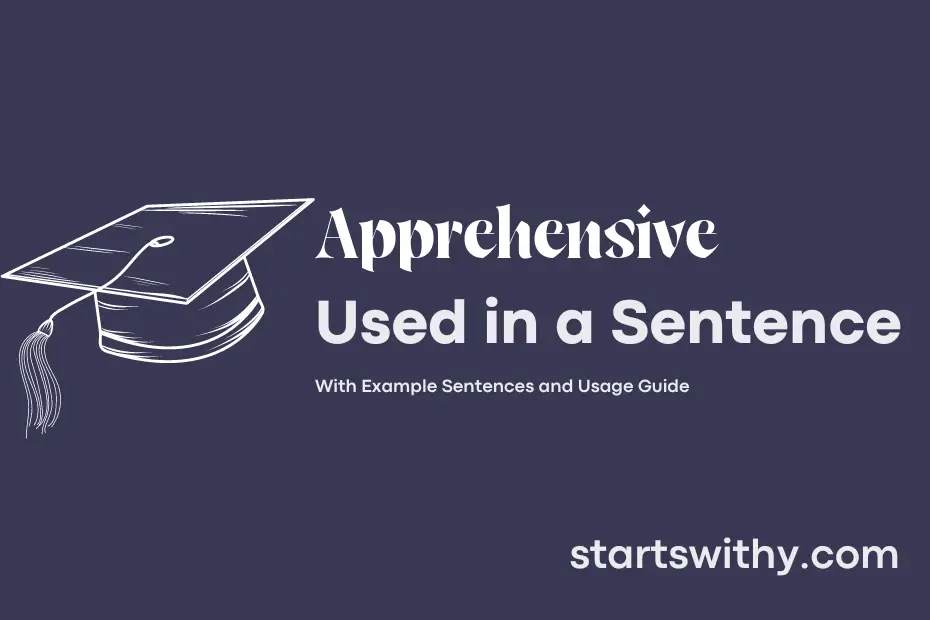Have you ever felt hesitant or anxious about trying something new or unfamiliar? That feeling of unease or nervousness is what we call being apprehensive. When someone is apprehensive, they are experiencing a sense of worry or concern about a future event or situation.
This common emotion can be triggered by a variety of factors, such as uncertainty, fear of failure, or lack of information. People may feel apprehensive before starting a new job, taking a test, or meeting someone for the first time. Acknowledging and understanding these feelings of apprehension can help individuals better manage and navigate through challenging circumstances.
7 Examples Of Apprehensive Used In a Sentence For Kids
- Apprehensive means feeling worried or nervous about something.
- It’s okay to feel apprehensive about trying new things.
- When you feel apprehensive, it can help to talk to someone you trust.
- Sometimes being apprehensive can make you hesitate, but it’s okay to take your time.
- It’s normal to feel a little apprehensive before starting something unfamiliar.
- Remember, everyone feels apprehensive sometimes, but you can always ask for help.
- Feeling apprehensive is natural, but you can still try your best and have fun!
14 Sentences with Apprehensive Examples
- Apprehensive students may feel overwhelmed by the academic challenges of college life.
- Some students are apprehensive about participating in group discussions during lectures.
- The thought of presenting in front of the class can make a student feel apprehensive.
- Students may be apprehensive about seeking help from their professors due to fear of judgment.
- Exam season can leave many students feeling apprehensive about their performance.
- Students may feel apprehensive about making friends in a new college environment.
- Apprehensive students might hesitate to join extracurricular activities for fear of failure.
- The transition from school to college can leave students feeling apprehensive about what lies ahead.
- Many students are apprehensive about balancing their academic workload with other responsibilities.
- Being in a new city for college can make students apprehensive about adjusting to a different lifestyle.
- Some students are apprehensive about asking questions in class for fear of sounding ignorant.
- Students may feel apprehensive about choosing a major that will shape their future career.
- Apprehensive students may struggle with public speaking assignments in college.
- The prospect of internships and job interviews can leave students feeling apprehensive about their professional future.
How To Use Apprehensive in Sentences?
To properly use the word Apprehensive in a sentence, first, you need to understand its meaning. Apprehensive means feeling worried or uneasy about something that may happen in the future.
When constructing a sentence with Apprehensive, make sure to include a subject and a verb to convey your message clearly. For example, “She felt apprehensive about the upcoming exam.”
It is important to note that Apprehensive is an adjective, so it is used to describe a noun or a pronoun. You can use it to express someone’s feelings or emotions about a particular situation. For instance, “He was apprehensive about going on a roller coaster for the first time.”
Remember to place Apprehensive before the noun that it is describing. This will help in making your sentence grammatically correct. For example, “The students were apprehensive about giving a presentation in front of the class.”
Try to practice using Apprehensive in different sentences to become more comfortable with its usage. As you become more familiar with the word, you will be able to incorporate it effectively into your writing and communication.
Conclusion
In conclusion, apprehensive sentences express doubt, worry, or fear about a future event or situation. They often convey a sense of unease or caution, reflecting an underlying sense of anxiety or trepidation. Whether it’s a deep concern about a job interview or an uncertain feeling about a new relationship, apprehensive sentences reveal the speaker’s state of mind and emotional vulnerability.
These sentences serve as a window into the inner thoughts and emotions of the speaker, highlighting their uncertainties and insecurities. By examining apprehensive sentences, we can gain insight into the complex ways in which people express their fears and concerns, allowing us to better understand their perspectives and offer support or reassurance when needed.



